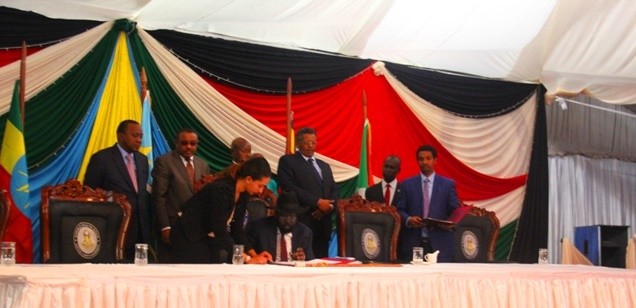The peace deal signed by President Salva Kiir on Wednesday in Juba mandates the creation of a new power-sharing government in South Sudan and sets up transitional justice mechanisms, security measures, and reconciliation initiatives.
Here are a few highlights:
Transitional government
– Transitional Government of National Unity shall form within 90 of signing. The period until then is called the “pre-transitional period.”
– The new transitional government will be in office for 30 months (2.5 years).
– There will be elections 60 days (2 months) before the term ends.
Ceasefire and security measures
– Permanent ceasefire within 72 hours of signing, all allied militias will have to be disengaged
– Withdrawal of all non South Sudanese forces from South Sudan with 45 days – this refers primarily to the Ugandan army (UPDF).
– Immediate release of all Prisoners of War
– All forces in the conflict areas will be assembled and cantoned within 30 days of the signing to enable screening, registration and/or disarmament. They will receive food, shelter and medical care.
– There will be a Joint Military Ceasefire Commission to oversee the cantonment.
– The warring armies will come under a ‘Unified Command’ within 18 months
– A Strategic Defence and Security Review will be set up that includes participation of the warring parties, the political parties, and also churches, women's organizations, youth groups and academics. It will suggest within 150 days a plan for transformation of the security sector.
Power-sharing
– The majority of positions in the Council of Ministers of the new national government will remain in the hands of the current Kiir-led administration (53%). The armed opposition (SPLM/A-IO) will take 33%, 7% will be for other parties, and 7% for the SPLM “Former Detainees”.
– Out of 30 ministers, this means that 16 will be current supporters of Kiir, 10 will be from the Machar faction, 2 from the Former Detainees and 2 from other parties.
– The power sharing in states of Jonglei, Unity and Upper Nile will be: 46% SPLM-Kiir, 40% SPLM-IO, 7% Former Detainees, 7% other political parties
– The power-sharing in the executive branch of the other 7 states will 85% for SPLM-Kiir and 15% for SPLA-IO.
– 7 ministers will be women.
– The parliament (National Legislative Assembly) will be expanded from 322 to 400 members. The incumbent members will remain in office. The added 68 members will be appointed by SPLM in Opposition (50), Former Detainees (1) and other political parties (17).
– All members unseated from the parliament following the crisis in December 2013 will be reinstated.
– The speaker will hail from Equatoria.
Presidency
– There will be a president, a first vice-president and a vice-president
– The incumbent president (Kiir) will remain the president and he remains the Commander in Chief of the South Sudan National Defence Forces
– The first vice president will be selected by SPLM in Opposition (led by Riek Machar), he will serve as the Commander in Chief of the Opposition forces in the first 90 days after signing until the armies of Kiir and Machar will be united. After that he will be acting commander in chief of the national defence forces only in the absence of the president.
– The president and the first vice-president have to agree on appointing state governors, military appointments and dismissals and appointments of the heads of independent commissions, for example, the Anti-Corruption Commission.
– The governors of Unity and Upper Nile will be appointed by the SPLA-IO and the governor of Jonglei will be appointed by Kiir.
– The Media Authority, an independent board for the media, as provided by law is not mentioned in the list of 18 independent government institutions to be established. Only the South Sudan Broadcasting Corporation is listed.
– The incumbent vice-president (James Wani Igga) will remain vice-president. He will mainly be involved in overseeing government national commissions
and parastatals
– In case of deadlock between the president and the vice-president a majority of 67% of the Council of Ministers is required to make a decision.
– The role of the SPLM remains unclear; the document hints at a ‘unified ruling party’, but the power-sharing ratios effectively treat the factions as distinct entities.
Reconstruction and Reconciliation
– A joint monitoring and evaluation commission will be established within 15 days based in Juba with 6 members from the parties, 7 civil society members, 12 members from the neighbouring states, AU and IGAD and 7 international members including China, UK, US, Norway, UN and EU. The chairman will be appointed by IGAD.
– An international Special Reconstruction Fund (SRF) will be established with a start of yearly 100 million dollars deposited by the government
– There will be a Compensation and Reparation Authority (CRA) for compensating victims
– There will be a Commission for Truth, Reconciliation and Healing (CTRH). It will be mandated establish an accurate historical record of human rights violations and receive applications from victims. It also should identify the perpetrators.
– The commission members will be appointed by the transitional government led by Salva Kiir, though with input from other bodies.
Justice
– A new Hybrid Court for South Sudan (HCSS) will be mandated to prosecute crimes including genocide, crimes against humanity, war crimes and other serious crimes like sexual violence.
– The court shall be established by the African Union. Most judges, prosecutors and defence counsels will come from African states other than South Sudan.
– No one shall be exempted from criminal responsibility on account of their official capacity as a government official, an elected official or claiming the defence of superior orders




